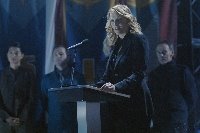 Source: Creative Loafing
Source: Creative Loafing'Battlestar Galactica' focuses its third season on a parallel universe -- ours
In television lore, Gene Roddenberry pitched "Star Trek" as "'Wagon Train' to the stars" and used the starship Enterprise to re-imagine Western-style adventures on the final frontier.
The Sci Fi cable channel's new version of "Battlestar Galactica" (9 p.m. Fridays) could be called "'The West Wing' in space." Starting its third season Oct. 6, the show retains the far-flung trappings of space opera but focuses on contemporary politics with laser-like intensity.
The final episode of "Battlestar Galactica's" previous season neatly summed up its twin concerns. Part of the plot featured a no-man-left-behind interplanetary rescue mission, full of faster-than-light spacecraft and marauding terminators. For all the derring-do, the more gripping plot involved, of all things, a presidential election and whether the high-integrity heroes should fix the popular vote in the name of the greater good. Viewers were more likely to be uncomfortably reminded of Katherine Harris than Darth Vader.
"Battlestar Galactica" not only revamps the late-1970s series of the same name, it elevates the entire genre of science fiction on television. The new "Galactica" cherry-picks some aspects of the original, a Star Wars knock-off starring Lorne Greene, including the premise. Both versions of "Battlestar Galactica" begin with 12 otherworldly human colonies (all named after zodiac signs) attacked and nearly wiped out by the robotic race of Cylons. The remainder of the human race travels across space in refugee ships seeking sanctuary at the legendary 13th colony known, of course, as Earth.
Some characters have been recast but remain the same, like Edward James Olmos as low-talking fleet commander Adama. Starbuck, the show's hotshot Han Solo, is now a brash, authority-defying woman (the appealingly tomboyish Katee Sackhoff). Frills like cute robot dogs are gone, and the new show features essentially contemporary clothes and technobabble-free dialogue. In some ways, it's appealingly low-tech. The Galactica may be a heavily armed, space-faring battleship, but Adama communicates not through fancy view screens but telephones -- with cords.
Minimizing the futuristic frills and space-cadet costumes brings the real-world concerns into sharper focus. The original series was little more than a juvenile action show, with episode titles such as "The Gun on Ice Planet Zero." The new "Galactica's" suspenseful perils are suffused with post-9/11 issues. The Cylons now feature models identical to human beings -- in fact, some "sleeper" agents may not even realize they're androids -- introducing a host of problems involving security and suspicion. The show's first two seasons set up a nearly constant tug-of-war between civilian and military authority, most chillingly when the Galactica encountered another surviving Battlestar, only one that had resorted to drafting civilians and raping enemy prisoners in the name of survival.
"Battlestar Galactica" may have found more respect and a wider following than any other science fiction program, largely because of its modern-day relevance and the conflicts between humans, and not flashy fights with mechanized monsters. Flesh-and-blood frailty frequently turns out to be the fleet's greatest danger, personified in such flawed figures as boozing, defensive Col. Tigh (Michael Hogan) or selfish, hedonistic Dr. Baltar (James Callis). Even Laura Roslin (the superb Mary McDonnell), the secretary-of-education-turned-president following the Cylon attack, proves at times willing to compromise her ironclad principles.
Season three begins -- at least at first -- with a revised premise with even higher stakes. Most of humanity has settled on the inclement planet of New Caprica, which the Cylons take over after about a year of settlement. With Baltar ruling in name only as a puppet president, and the settlement resembling an endless tent city, New Caprica evokes nothing so much as a Cold War-era Soviet satellite country, or perhaps a Siberian gulag. In a distant corner of space, Adama and a skeleton crew on the Galactica try to solve the impossible tasks of either retaking the planet or rescuing its population.
With frequent discussions of the human "insurgency," "Battlestar Galactica's" new season directly derives from issues surrounding the War on Terror and the U.S. presence in Iraq. One Cylon, played by Dean Stockwell, indirectly evokes the liberation of Baghdad by remarking, "They didn't exactly welcome us with, well... ." The show may not overtly oppose the Iraq War, but the writers clearly want their audience to consider the consequences of current geopolitical decisions, like detaining and abusing prisoners without charge.
The Oct. 6 premiere hinges on a charged debate, primarily between an out-of-office Roslin and resistance leader Tigh, over whether the human rebels can justify the use of suicide bombings.
"Battlestar Galactica" relies on more than charged conversations. The show's computer-generated outer-space dogfight scenes come across as a bit clean and cold, but the on-the-ground commando-style battles, clearly inspired by Saving Private Ryan and Vietnam War films, create chilling levels of intensity. The narrative leap to the New Caprica story arc can be confusing, but the 10 online "webisodes" provide helpful transition. Beyond just a YouTube-driven marketing gimmick, the 25-minute backstory introduces some minor but soon-to-be-significant characters, and how their divided loyalties drive them toward the resistance, in the name of freedom, or to the civilian "collaborator" police force, in the name of peace.
Soon enough, "Battlestar Galactica's" so-called "ragtag, fugitive fleet" will resume its mission to Earth. For the time being, the engrossing series suggests what Star Wars would have looked like as the creation of a Soviet dissident. Programs like the original series provided simple escapism, but the new "Battlestar Galactica" uses science fantasy not to send viewers away from the difficult issues of the day, but directly toward them.
Newshound: SciFi
No comments:
Post a Comment